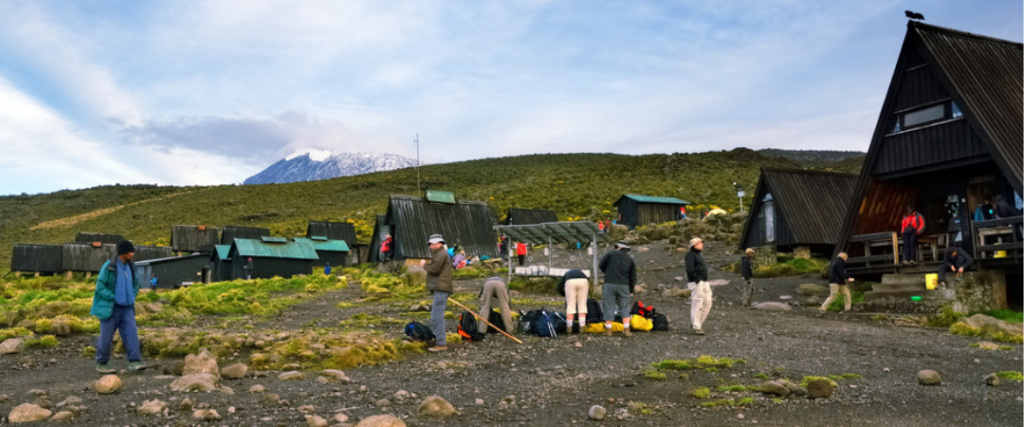Tour Overview
Known as the “Coca-Cola” route, the Marangu route is a classic trek on Mount Kilimanjaro. It is the oldest, most well established route. Many favor the Marangu route because it is considered to be the easiest path on the mountain, given its gradual slope. It is also the only route which offers sleeping huts in dormitory style accommodations.
The minimum days required for this route is five, although the probability of successfully reaching the top in that time period is quite low. Spending an extra acclimatization day on the mountain is highly recommended when climbing Kilimanjaro using the Marangu route.

Day by Day Itinerary
Elevation Gain: 870 metres / 2,900 feet
This morning you will be met by your head guide. Leave Moshi and drive for approximately 45 minutes to the Marangu gate. After registration, begin trekking through lush undisturbed forest where you may be lucky enough to see Colobus monkeys. The path gradually climbs to your camp at Mandara Huts, a trek taking approximately 4 to 5 hours. Mandara Huts is a group of wooden A-framed huts in a forest clearing. Each hut features 6-8 sleeping bunks with solar generated lighting. The total capacity of the camp is 60 climbers. Water is piped into the camp from springs above and there are flush toilets behind the main hut. The volcanic remains of Maundi Crater are nearby, and make a good afternoon excursion. Alternatively simply rest and enjoy the beautiful forest around you.
Elevation Gain: 1,020 metres / 3,300 feet
From Mandara Hut the trail climbs steeply through a short stretch of forest, soon emerging into grassy moorland. On a clear day, you will catch your first glimpse of Kibo, the summit cone of Kilimanjaro, and the jagged second peak Mawenzi. We climb steadily through the moorland zone, containing giant heather and occasional groundsel which can reach heights of up to 5 metres. After around 4 to 6 hours walking today you will reach the hut complex at Horombo where you will have hot washing water, dinner and overnight. Horombo is a village of huts perched on a small plateau with buildings similar to Mandara, but with a total capacity of 120 climbers!
Today you can have a lie in, as you will be staying at Horombo Huts for a second night and therefore do not need to pack! This extra day and night will aid your acclimatisation and is therefore very important in preparation for your summit attempt. The day will be spent hiking towards the seldom visited base of Mawenzi Peak, passing Zebra Rocks en route. The landscape feels more alpine here and there is a greater sense of peacefulness than in other locations on this route. Trekking time approximately 4 to 5 hours.
Elevation Gain: 980 metres / 3,200 feet
After breakfast you will continue your ascent into the alpine desert, heading towards the saddle between Kibo and Mawenzi. The terrain is much more open here and there is a palpable sense of high altitude wilderness. You will arrive in camp for lunch giving you the afternoon to rest before your summit attempt.
Elevation Gain: 1,195 metres / 3,940 feet
Elevation Loss: 2,175 metres / 7,140 feet
Around midnight, begin the final ascent to Uhuru Peak, the highest point in Africa. For the next six hours, hike by the light of your flashlight. The ascent to the crater rim is the most challenging part of the entire trek. The trail is very steep until you reach the crater rim at Gilman’s Point. The hike from Gilman’s to Uhuru Peak is a gradual climb and, as far as hikes go, not very difficult. The altitude, however, makes the hike long and tiring. After summit celebrations you will descend to Kibo Huts. You will eat here before continuing your descent to Horombo Huts. This will seem surprisingly fast. The total time spent walking on this day is around 14 hours, so be prepared for a very tough day. Later in the evening enjoy your last dinner on the mountain and a well-earned sleep.
Elevation Loss: 1,890 metres / 6,200 feet
After breakfast, finish the trek with a descent to Marangu Gate. Your last hike on Kilimanjaro is a beautiful one, passing through Kilimanjaro’s cloud forest. Watch your step during the descent, as the trail can be slippery. This trek will take approximately 5-6 hours. At the gate, you will be met and transferred back to Moshi.
Prices Include:
Park fees, camping fees, rescue fees, head guide, assistant guides, cook, & porters salaries, all food, drinking water, tents, transport to/from park entry gate.
Additional Costs:
* Hiring of clothing, sleeping bags, walking poles etc.
* Tipping to your guides, cook and porters. The standard recommendation for this is USD$20 per day to the head guide, $12 per day to the assistant guide, $12 per day to the cook and $5 per day per porter. These costs are split between everyone doing the climb.